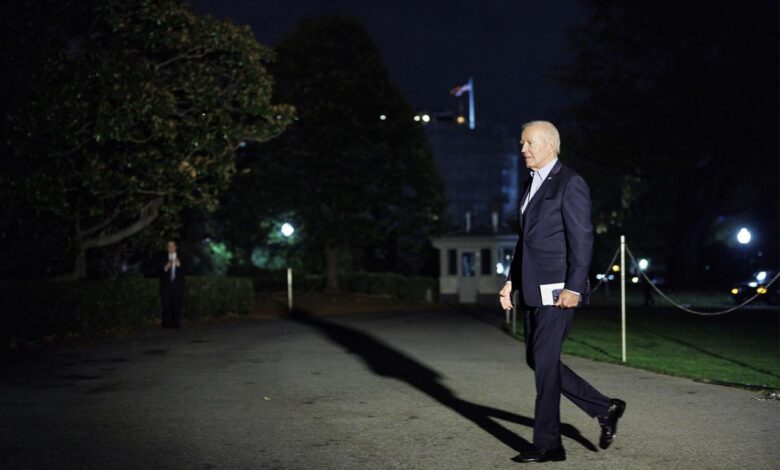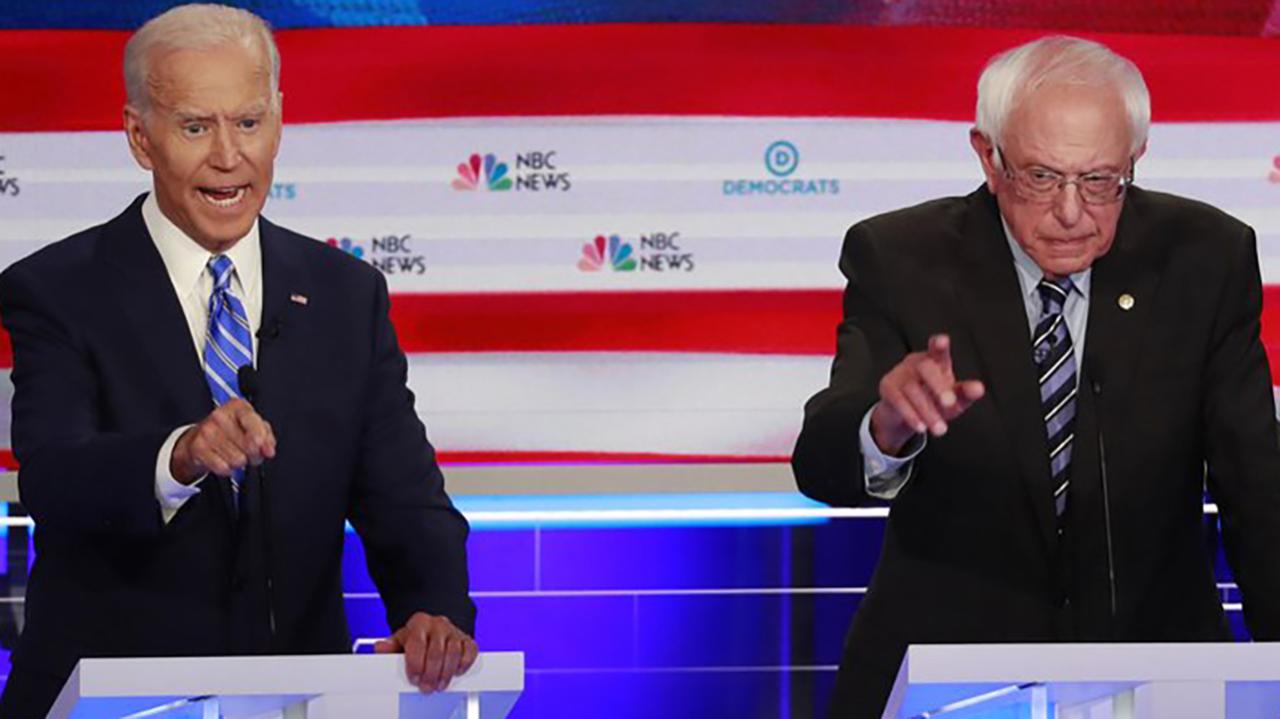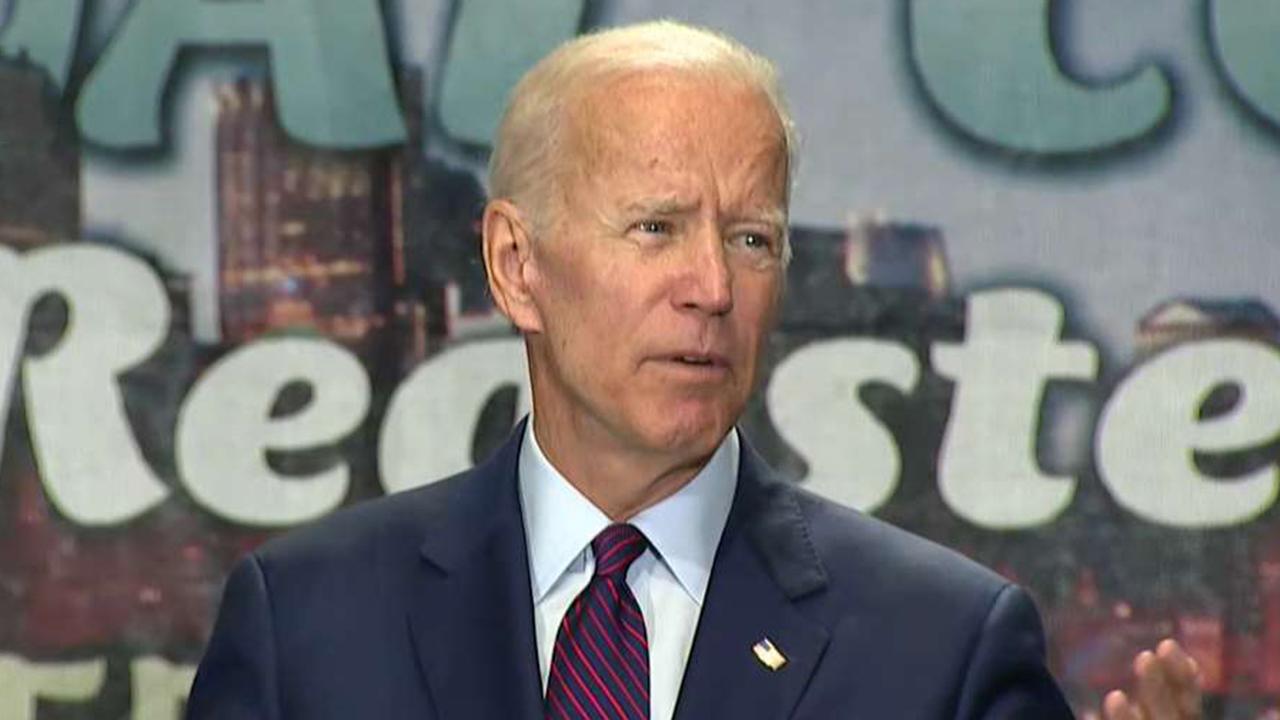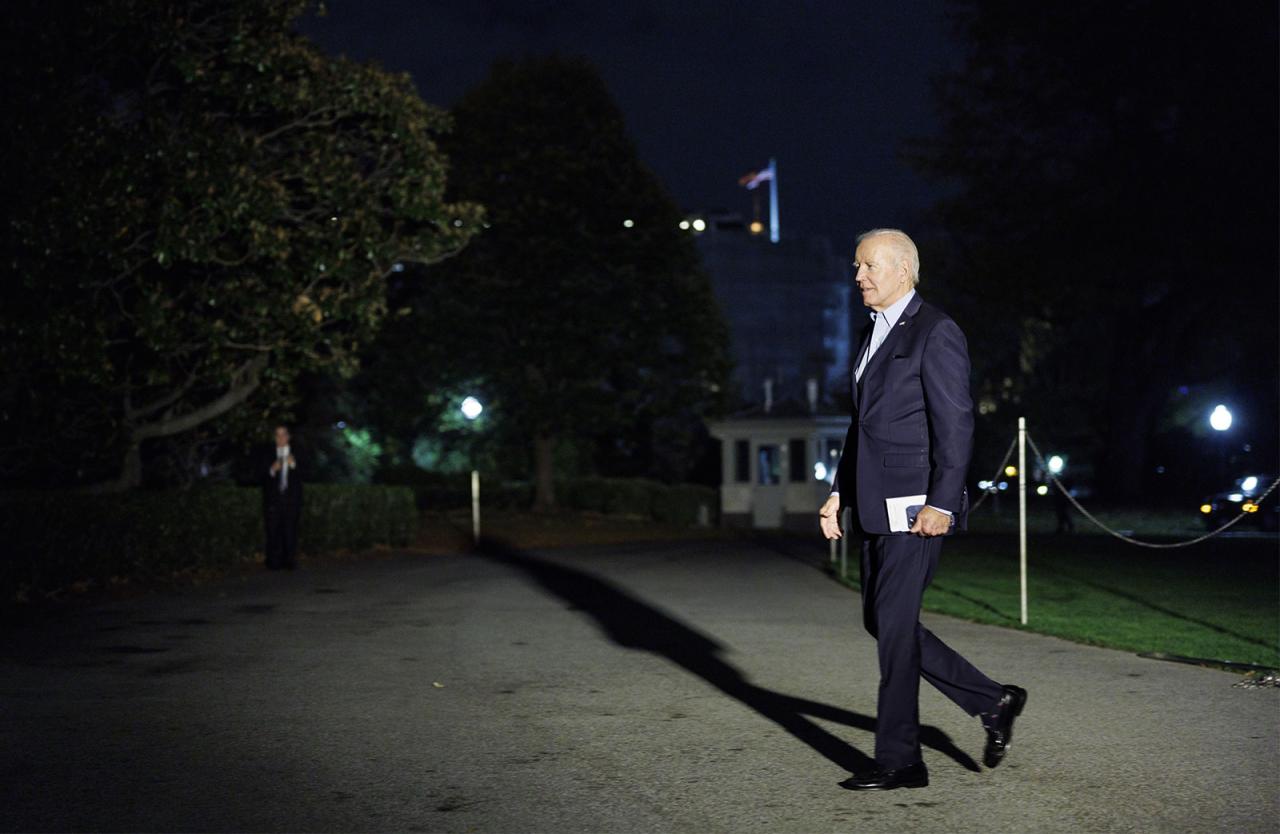
After a Disastrous Debate, Will Biden Step Aside?
After a disastrous debate performance will Joe Biden step aside? That’s the question on everyone’s mind after President Biden’s less-than-stellar showing. The debate, widely considered a crucial moment in the election cycle, left many questioning his ability to effectively lead the country. Was it a momentary lapse, or a sign of deeper issues? This post dives into the aftermath, exploring the public reaction, media coverage, and the potential ramifications for Biden’s campaign and the future of the Democratic party.
We’ll look at the various scenarios that could unfold, from a campaign overhaul to the unthinkable: a withdrawal from the race.
We’ll analyze Biden’s performance, dissecting key moments and comparing them to previous debates. We’ll also examine the public’s response, both online and in the traditional media, paying close attention to the potential influence of media bias. Finally, we’ll speculate on the political implications, considering historical precedents and exploring the potential consequences for the Democratic party if Biden were to step down.
Get ready for a deep dive into the heart of this electrifying political moment.
Biden’s Debate Performance

President Biden’s recent debate performance has sparked considerable discussion and analysis. While previous debates saw him display moments of strength and command, this particular performance elicited mixed reactions and raised questions about his fitness for a second term. This analysis will delve into the specifics of his communication style, pinpoint key moments that shaped public perception, and consider the potential ramifications for his campaign.
Biden’s Verbal and Nonverbal Communication
Biden’s verbal communication during the debate was, at times, halting and less articulate than in previous appearances. He stumbled over words on several occasions, and his delivery lacked the usual crispness and confidence. His nonverbal communication also seemed to reflect this uncertainty. Body language, including posture and facial expressions, often appeared hesitant and less engaged than anticipated.
While there were moments of forceful argumentation, these were interspersed with periods of seeming disengagement, potentially contributing to a less impactful overall presentation. The contrast with his previous performances, characterized by more assertive and consistent delivery, was stark.
Key Moments Impacting Audience Perception
Three key moments significantly affected audience perception of Biden’s performance. First, a noticeable stumble during his response to a question about the economy created a sense of vulnerability and raised concerns about his cognitive abilities. Second, a seemingly dismissive response to a question regarding his son Hunter’s business dealings appeared tone-deaf and defensive to some viewers, potentially alienating undecided voters.
Finally, his closing statement lacked the inspirational energy and clear policy focus observed in previous debates, leaving some viewers feeling unmoved or unconvinced.
So, the big question everyone’s asking is: after a disastrous debate performance, will Joe Biden step aside? It’s a tough call, and honestly, my mind wandered to completely unrelated things while pondering it, like whether Xi Jinping can actually revive China’s unicorn scene, as discussed in this insightful article: can xi jinping revive chinas unicorn scene. It’s a fascinating parallel – the pressure on both leaders is immense, and the stakes are incredibly high.
Ultimately, though, Biden’s future hinges on his own performance and the decisions of his party, not the fortunes of Chinese tech startups.
Comparison to Previous Debate Appearances
Compared to his previous debate appearances, this performance marked a significant departure. In past debates, Biden demonstrated a stronger command of the issues, a more assertive delivery style, and a greater capacity to connect with the audience on an emotional level. While he has always been known for his sometimes rambling speaking style, this instance saw a more pronounced lack of clarity and a noticeable decline in energy.
The difference is arguably attributable to a combination of factors, including age, fatigue, and the pressure of the high-stakes political environment.
Potential Consequences on Voter Sentiment
The consequences of Biden’s performance on voter sentiment are potentially significant. The less-than-stellar showing could erode his support among undecided voters and potentially energize his opponents’ base. Negative media coverage following the debate could further exacerbate these effects, leading to a shift in public opinion. While it’s too early to definitively assess the long-term impact, the debate undoubtedly presents a challenge to his campaign’s efforts to secure a second term.
So, the big question everyone’s asking is: after a disastrous debate performance, will Joe Biden step aside? It’s a tough call, and honestly, feels a bit like watching the airline industry freefall – check out this article on how things are going south for budget carriers like Southwest and Spirit: from southwest to spirit budget airlines are in a tailspin.
The parallels are striking; both situations involve a loss of confidence and a need for serious course correction. Will Biden, like these airlines, manage to pull out of the dive?
The immediate reaction on social media and initial polling data will provide some indication of the extent of this impact. However, the ultimate consequences will likely depend on how effectively the Biden campaign addresses the concerns raised by the debate performance.
Analysis of Key Moments
| Moment | Description | Impact on Audience | Potential Long-Term Effect |
|---|---|---|---|
| Economic Policy Stumble | Biden appeared to lose his train of thought while discussing economic policy, leading to a halting and unclear response. | Created doubt about his competence and understanding of key issues. Some viewers expressed concern about his cognitive abilities. | Potential erosion of support among undecided voters and reinforcement of negative narratives among opponents. |
| Response to Hunter Biden Question | Biden’s response to questions about his son’s business dealings was perceived by some as dismissive and defensive. | Alienated some viewers, particularly those who view the issue as important. Could be seen as lacking transparency and accountability. | Potential damage to his credibility and trustworthiness, potentially affecting support among independent voters. |
| Closing Statement | Biden’s closing statement lacked the usual energy and clear policy focus, leaving some viewers unmoved. | Failed to capitalize on a crucial opportunity to solidify his message and inspire voters. Left a sense of anticlimax. | Potential loss of momentum and a missed opportunity to sway undecided voters. Could contribute to a perception of weakness. |
Public Reaction and Media Coverage

The aftermath of a disastrous debate performance can significantly impact a candidate’s standing, and the immediate reactions from the media and the public often serve as a barometer of that impact. Analyzing this response helps us understand the ripple effect of such an event on the overall election landscape. The speed and scale of modern communication, particularly through social media, amplify these reactions exponentially, creating a complex and rapidly evolving narrative.The immediate reactions following Biden’s debated performance were varied and intense.
News outlets offered a range of interpretations, some focusing on specific gaffes or policy disagreements, while others attempted a more holistic assessment of the candidate’s overall performance. Political commentators, known for their often partisan viewpoints, offered commentary that reflected their existing political alignments, further polarizing the public discourse. Cable news networks, in particular, provided extensive coverage, often broadcasting live analysis and interviews throughout the night and into the following days.
Social Media Sentiment Analysis
Social media became a significant battleground for opinions on Biden’s performance. The sheer volume of posts, tweets, and comments created a massive dataset reflecting a spectrum of emotions. A significant portion of the response was negative, with many users expressing disappointment, concern, or outright criticism of Biden’s perceived lack of clarity or command of the issues. A smaller, but still substantial, portion expressed positive sentiments, praising Biden’s experience or highlighting certain aspects of his responses.
Finally, a neutral segment remained, either offering observations without strong emotional tones or expressing general uncertainty about the debate’s impact. This division mirrored the existing political divides within the population, with supporters rallying around their candidate and detractors amplifying their criticisms.
Comparative Coverage of Candidates
The media’s coverage of Biden’s performance was inevitably compared to the coverage of his opponent’s performance. This comparative analysis became a key element in shaping public perception. The framing of the debate, the emphasis on particular moments, and the overall tone of the reporting could vary significantly depending on the news outlet’s political leanings. For example, some outlets might focus on Biden’s perceived weaknesses, while others might highlight his strengths or contextualize his performance within the broader political landscape.
This differential coverage directly contributed to the fragmented and often contradictory narratives surrounding the debate.
Media Bias and Public Perception
The influence of media bias on public perception is undeniable. Different news outlets, with their distinct editorial stances and target audiences, often present information in a way that reinforces pre-existing beliefs. This can lead to echo chambers, where individuals are primarily exposed to information that confirms their existing views, exacerbating political polarization. The way a news outlet frames a candidate’s performance – whether through carefully chosen words, the selection of specific clips, or the overall tone of the reporting – significantly impacts how viewers interpret the event.
The potential for biased reporting to shape public opinion is a significant concern in democratic societies.
Examples of Headlines from Different News Sources
The following bullet points illustrate the variety of headlines and the potential for biased framing across different news sources:* Fox News: “Biden Struggles in Debate, Raises Concerns About Fitness for Office”
CNN
“Biden Faces Tough Questions, But Holds His Own in Tense Debate”
The New York Times
“Debate Highlights Sharp Policy Differences Between Candidates”
The Wall Street Journal
“Biden’s Performance Underscores Challenges Facing His Campaign”
Breitbart News
“Biden’s Debate Disaster: A Clear Sign of Cognitive Decline”
Impact on Biden’s Campaign Strategy

A disastrous debate performance can significantly alter a presidential campaign’s trajectory, forcing a rapid reassessment of strategy and messaging. Biden’s debate, if indeed disastrous, would necessitate immediate and decisive action to mitigate the damage and regain momentum. The campaign would need to analyze public reaction and media coverage to pinpoint specific areas of weakness and tailor its approach accordingly.The campaign’s immediate response would be crucial in shaping public perception.
A swift and decisive response is key to preventing negative narratives from taking hold. The campaign would likely employ a multi-pronged approach, focusing on damage control, strategic messaging adjustments, and potentially even altering the campaign schedule.
Messaging Adjustments
Following a poor debate performance, Biden’s campaign would likely shift its messaging to address the concerns raised. This might involve emphasizing different aspects of his platform, perhaps focusing on areas where he excels and downplaying issues where he struggled in the debate. For example, if the debate highlighted concerns about his age and cognitive abilities, the campaign might counter this by showcasing Biden’s experience and leadership on key policy issues, perhaps releasing carefully crafted videos highlighting his accomplishments.
Conversely, if economic policy was a weak point, the campaign may pivot to emphasize Biden’s plans for job creation and economic growth, perhaps focusing on specific initiatives and their potential benefits to different demographics.
Communication Strategy Adjustments
The communication strategy would likely become more targeted and focused. Instead of broad appeals, the campaign might concentrate on reaching specific demographics with tailored messages addressing their concerns. This could involve increased use of social media to directly engage with voters, focusing on counter-messaging to address negative perceptions stemming from the debate. The campaign may also increase its reliance on surrogates – trusted figures within the Democratic party – to defend Biden and counter negative narratives.
This strategy allows for a more nuanced and targeted response to criticisms, while also allowing Biden to focus on more positive messaging.
So, the question everyone’s asking is: after a disastrous debate performance, will Joe Biden step aside? It’s a tough call, and frankly, distractions abound. For instance, I just read about Huawei’s new software, a bold move detailed in this article: huaweis new made in china software takes on apple and android. That kind of technological disruption is certainly a different kind of political earthquake.
But back to Biden – the stakes are undeniably high.
Campaign Schedule Changes
Depending on the severity of the debate’s impact, the campaign might adjust its schedule to focus on events and appearances that better showcase Biden’s strengths. This could mean prioritizing smaller, more intimate town halls or rallies where he can directly connect with voters, rather than large-scale events that might amplify negative perceptions. The campaign may also allocate more resources to specific states or regions where the damage from the debate is most pronounced.
Focusing on areas with higher voter turnout potential could also help offset any negative impact.
Examples of Successful Recoveries
History offers examples of presidential campaigns that successfully recovered from poor debate performances. The 1980 presidential debates between Ronald Reagan and Jimmy Carter saw Reagan deliver a strong performance that shifted the momentum of the race. While Carter’s performance wasn’t disastrous, Reagan’s success demonstrated the potential for a single debate to dramatically impact public opinion. Similarly, in 2012, Mitt Romney’s strong performance in the first debate against Barack Obama temporarily shifted the momentum in his favor, demonstrating that even a single strong performance can have a significant impact on the campaign narrative.
Potential Campaign Adjustments
| Area of Adjustment | Specific Action | Rationale |
|---|---|---|
| Messaging | Shift focus to Biden’s strengths (e.g., experience, policy expertise), directly addressing concerns raised in the debate through targeted messaging. | To counter negative perceptions and highlight Biden’s positive attributes. |
| Communication Strategy | Increase targeted communication through social media and surrogates, focusing on counter-messaging and direct engagement with voters. | To control the narrative and address concerns raised in the debate directly and effectively. |
| Campaign Schedule | Prioritize smaller, more intimate events allowing for direct voter interaction and focusing on regions most affected by the debate’s negative impact. | To improve public perception and regain voter trust in a more controlled environment. |
Political Implications and Speculation on Stepping Aside
Biden’s disastrous debate performance has sent shockwaves through the Democratic party, sparking intense speculation about his viability as a candidate and the potential consequences of him withdrawing from the race. The immediate impact on his poll numbers will be crucial, but the longer-term political ramifications extend far beyond the current election cycle.The potential impact of Biden’s performance on his chances of winning the election is significant.
A poor debate can erode public confidence and shift momentum towards his opponent. While it’s impossible to definitively quantify the damage at this stage, historical precedents suggest that a weak debate showing can severely hamper a candidate’s electability, especially when coupled with other negative factors like declining approval ratings or emerging scandals. The extent of the damage will depend heavily on the media’s coverage and the public’s overall perception of the event.
Historical Precedents for Candidate Withdrawal
Several historical examples illustrate the impact of poor debate performances on presidential campaigns. While few candidates have explicitly withdrawnsolely* because of a debate, the pressure exerted by a poor showing has led to significant campaign shifts. For instance, consider the 1960 Kennedy-Nixon debates. While Nixon’s performance wasn’t disastrous, his appearance (pale and sweating) compared to Kennedy’s charisma was seen as a significant factor in Kennedy’s victory.
While Nixon didn’t withdraw, the debate significantly impacted the trajectory of his campaign. Other instances, while not directly comparable, show how damaging poor performance can be, leading to a change in campaign strategy, increased focus on ground game, or even the adoption of a defensive posture. These examples, while not directly resulting in withdrawals, highlight the pressures candidates face and the potential consequences of a weak showing.
Political Consequences of Biden Stepping Aside
If Biden were to step aside, the immediate consequence would be chaos within the Democratic party. A scramble for a replacement nominee would ensue, potentially fracturing the party and alienating voters. The timing would be critical; a late replacement could severely hamper the campaign’s organization and fundraising efforts. The chosen replacement would likely inherit a damaged campaign and face an uphill battle against the incumbent.
This could significantly impact voter turnout and enthusiasm, potentially handing the election to the opposing party. Furthermore, a late change in nominee could lead to legal challenges regarding ballot access and voter confusion.
Impact on the Democratic Party and its Future Prospects
The impact on the Democratic Party’s future would be profound. A loss in the presidential election, especially under these circumstances, would lead to internal divisions and soul-searching. Questions about the party’s direction, its messaging, and its ability to attract and retain voters would dominate the post-election analysis. The party’s ability to recover and regroup for future elections would be severely tested, potentially impacting down-ballot races and future electoral success.
The long-term consequences could be significant, potentially leading to a period of internal struggle and realignment.
The potential ramifications of Biden withdrawing from the race are substantial: immediate chaos within the Democratic party, a weakened campaign, a potentially insurmountable challenge for a replacement candidate, and lasting damage to the party’s image and future prospects. The election outcome would be highly uncertain, with a significant risk of handing the presidency to the opposing party.
Alternative Scenarios and Their Implications: After A Disastrous Debate Performance Will Joe Biden Step Aside
President Biden’s hypothetical withdrawal from the presidential race would trigger a cascade of events with significant implications for the Democratic Party and the upcoming election. The process of selecting a replacement, the strengths and weaknesses of potential candidates, and the ultimate impact on the election’s outcome are all deeply intertwined and uncertain.
The Process of Selecting a Replacement, After a disastrous debate performance will joe biden step aside
If President Biden were to withdraw, the Democratic Party would need to quickly convene its national committee to determine the process for selecting a replacement candidate. The party rules would likely guide this process, but the unprecedented nature of the situation could lead to intense negotiations and potential disputes. Several scenarios are possible, ranging from a swift endorsement of Vice President Kamala Harris, to a more protracted process involving a national convention or a primary election.
A rapid selection would aim to minimize disruption and maintain party unity, while a more drawn-out process might allow for a broader range of candidates to emerge and could potentially energize the base but risk internal divisions. The timeline would be critical, as the election is rapidly approaching. Past precedents, such as the replacement of a candidate due to death or incapacitation, offer limited guidance given the unique political circumstances of a voluntary withdrawal.
Strengths and Weaknesses of Potential Replacement Candidates
Vice President Kamala Harris is the most obvious successor. Her strengths include her existing national profile, experience in the Senate and as Attorney General, and her position as the current Vice President. However, her weaknesses include her relatively low approval ratings and some criticism of her past policy positions. Other potential candidates, depending on the timeline and chosen process, might include prominent governors, senators, or other high-profile Democrats.
Each would bring their own strengths and weaknesses to the table, influencing their viability as a replacement and their ability to garner support. For example, a governor with a strong record of economic development might appeal to moderate voters, while a senator with a progressive platform might energize the party’s base. A crucial factor would be each candidate’s ability to unify the party and appeal to a broad electorate.
Impact on the Election if a Different Candidate Were to Take Biden’s Place
The impact of a replacement candidate would depend heavily on several factors, including the chosen candidate’s political profile, their ability to campaign effectively in the remaining time, and the public’s reaction to the change. A candidate with a significantly different platform or style than President Biden could alienate some voters while attracting others. For instance, a more progressive candidate might energize the Democratic base but could alienate moderate voters who supported Biden.
Conversely, a more moderate candidate might appeal to swing voters but fail to inspire the party’s most ardent supporters. The timing of the replacement would also be crucial, as a late substitution could leave insufficient time for the new candidate to build momentum and establish name recognition. The potential impact on fundraising and campaign organization would also be significant.
Hypothetical Scenario: A Replacement Candidate is Chosen
Let’s imagine a scenario where President Biden withdraws from the race following a disastrous debate performance, and the Democratic National Committee opts for a relatively swift selection process. They endorse Vice President Kamala Harris as the replacement candidate. This decision, while seemingly straightforward, would still involve intense internal negotiations and require a rapid mobilization of resources. The campaign would need to pivot quickly, adjusting messaging, fundraising strategies, and campaign schedules.
Harris would likely need to immediately address the concerns raised by Biden’s debate performance and present a clear vision for her presidency. The success of this scenario would hinge on Harris’ ability to effectively unite the party, convince wavering voters, and project confidence and competence. Polls would fluctuate wildly in the immediate aftermath, and the Republican candidate would undoubtedly exploit the situation.
The outcome would be highly uncertain, depending on the public’s reaction to Harris’s candidacy and her effectiveness in the remaining campaign period. This would be a high-stakes gamble, and the result would likely depend on a combination of factors, including the candidate’s performance, media coverage, and the broader political climate.
So, will Joe Biden step aside after his debated performance? The answer, at least for now, remains uncertain. While the immediate aftermath was filled with intense speculation and analysis, the long-term effects are yet to be seen. The coming weeks will be critical, revealing whether the campaign can effectively address the concerns raised during the debate or if the damage proves irreparable.
One thing is certain: this debate has profoundly altered the political landscape, injecting unprecedented uncertainty into what was once a seemingly predictable election. The fallout from this debate will continue to shape the narrative for months to come, leaving us all to wonder: what happens next?




